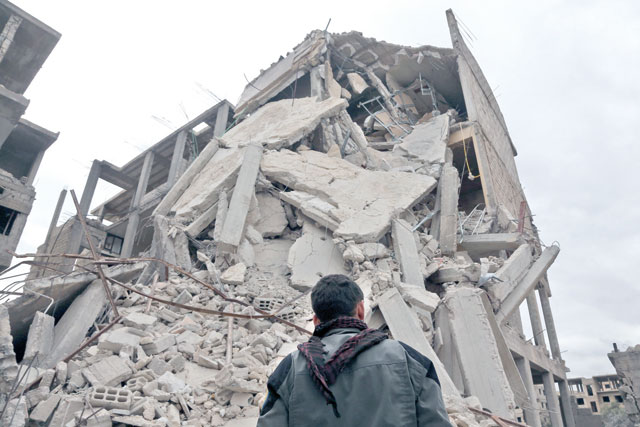BEIRUT/GENEVA — Syrian government forces launched a ground assault on the edge of the rebel-held Eastern Ghouta enclave on Wednesday, seeking to gain territory despite a Russian plan for five-hour daily ceasefires, a war monitor and sources on both sides said.
Hundreds of people have died in 11 days of bombing of the Eastern Ghouta, a swathe of towns and farms outside Damascus that is the last major rebel-held area near the capital.
The onslaught has been one of the fiercest of the civil war, now entering its eighth year.
The UN Security Council, including President Bashar Assad's strongest ally Russia, passed a resolution on Saturday calling for a 30-day countrywide ceasefire, but it has not come into effect, with Moscow and Damascus saying they are battling members of terrorist groups excluded from the truce.
Russia has instead called for daily five-hour local ceasefires to establish what it calls a humanitarian corridor so aid can enter the enclave and civilians and wounded can leave.
The first such truce took place on Tuesday, but quickly collapsed when bombing and shelling resumed after a short lull.
There were no air strikes during Wednesday’s five-hour ceasefire, but heavy bombardment resumed in the afternoon, the Syrian Observatory for Human Rights monitoring group reported. There has been no sign of aid delivered to the besieged area.
Moscow and Damascus have accused rebels of shelling the corridor to prevent people leaving. Rebels deny this, and say people will not leave eastern Ghouta because they fear the government. A senior US general accused Moscow of acting as “both arsonist and firefighter” by failing to rein in Assad.
Wednesday’s ground assault targeted the Hawsh Al Dawahra area at the eastern edge of the rebel-held area.
The observatory reported advances by the government forces in the area, describing it as the resumption of an assault that first began on February 25. It said rebels had inflicted heavy losses on government forces.
An official with one of the rebel groups in eastern Ghouta said fighters were battling to repel an attempted incursion, and characterised the battle as “back and forth”.
A commander in the military alliance that backs Assad said an elite unit of the Syrian army, the Tiger Force, was taking part in the assault and advances had been made.
France’s foreign ministry called on Russia and Iran, Assad’s other military ally, to exert “maximum pressure” on the Syrian government to implement the 30-day ceasefire.
But with no sign of decisive international pressure to stop the attack, eastern Ghouta appears on course to eventually meet the same fate as other areas won back by the government in lengthy, punishing assaults, where rebels and civilians who oppose Assad were finally evacuated in negotiated withdrawals.
Damascus appears to be applying tried and tested military means, combining air strikes and bombardment with ground assaults, as it did to win back eastern Aleppo in 2016.
A senior Western diplomat said Russia appeared intent on a repeat of Aleppo in eastern Ghouta by evacuating the area and then killing “the terrorists even if it’s not just Nusra”, a reference to a extremist group with Al Qaeda links.
Diplomatic sources have said the chemical weapons watchdog, the Organisation for the Prohibition of Chemical Weapons, opened an investigation into attacks in eastern Ghouta to determine whether banned munitions were used.
The United States says it has evidence Syrian forces have used chlorine, which is permitted for civilian purposes but banned as a weapon, in attacks in eastern Ghouta and elsewhere.
US disarmament ambassador Robert Wood said on Wednesday that Russia has violated its duty to guarantee the destruction of Syria’s chemical weapons stockpile and prevent the Assad government from using poison gas.
Syria agreed to give up its stockpile of poison gas and join the international chemical weapons ban in 2013 under a Russian-brokered deal that averted US retaliatory air strikes after a nerve gas attack killed hundreds of people. Washington accused Damascus last year of again using nerve gas and carried out a round of air strikes as punishment.
Russian Foreign Minister Sergei Lavrov said Syria had eliminated its poison gas stockpiles, and called allegations it was still using chemical weapons “absurd”.
Lavrov said militants entrenched in Eastern Ghouta were blocking aid and the evacuation of people who want to leave. Moscow would continue to support the Syrian army in totally defeating the “terrorist threat”, Lavrov told the UN Human Rights Council in Geneva.
A Syrian army officer told journalists insurgents had shelled the corridor again on Wednesday.
